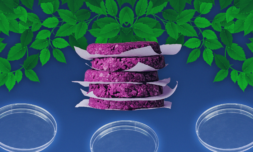Now, Notpla has secured $13 million in funding from Horizon Ventures to begin finding sustainable replacements for notoriously hard to recycle plastics, like the protective film found on food packets.
The goal of the project is not to just switch this plastic with a material that can be more easily recycled, but with packaging that disappears all together. The multi-million-dollar funding will help to improve the performance of the plant-based material already used for Ooho pouches.
In recent experiments, Notpla’s workers discovered that seaweed is far easier to manipulate than plastic. It behaves differently and is substantially more versatile compared to traditional plastic chemicals like polyethylene or polypropylene.
The tasteless, plastic-like seaweed film dissolves completely when dropped into hot water, offering an environmentally friendly alternative for wrappers around single serving coffee pouches, noodle packets, and teabags.
A single teabag made from plastic can release as many as 11 billion microplastics into hot water. Notpla’s soluble teabags would do the same job – minus the plastics of course – and provide increased fibre intake (thanks to the natural seaweed) and could even be infused with antioxidants to increase health benefits.
The film is already being trialled to hold sauces and dressings, designed to be eaten afterward – if you’re feeling extra hungry.
The possibilities of this new packaging don’t stop at food.
Seaweed-based films could also encapsule household liquids such as plastic wrapped washing pods, which don’t fully dissolve. Most end up rinsed out of machines before beginning a long, endless journey through our water systems.
With more trials conducted to increase durability, the plant-based ‘plastic’ be used for packaging we’re accustomed to receiving clothing orders in. This would reduce our plastic consumption greatly, as the fashion industry is responsible for 26 percent of plastic film produced each year.
Pierre-Yves Paslier, the CEO of Notpla said, ‘We’re leveraging the natural attributes of seaweed and things you find in nature and not only replacing things that have been made out of plastic but rethinking the format.’
Considering that single use packaging accounts for 70 percent of the plastic waste we throw away each year, implementing a sustainable solution could be a game changer for people and the planet.
It’s very encouraging to see large sums of funding going towards plant-based replacements for widely used plastic materials. And though they may be slow to implement on a global scale, Notpla is certainly taking a huge step in the right direction.





















